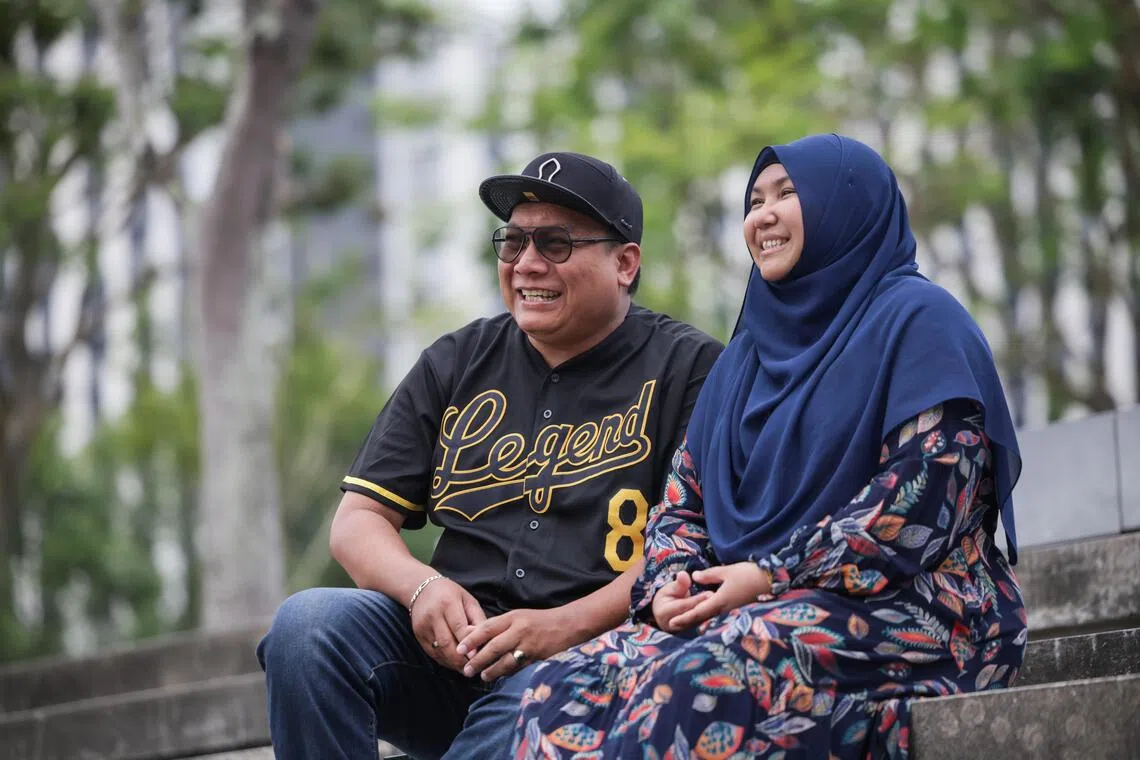Life After... drug addiction: Husband and wife duo inspire others to kick the habit
So much of the news is about what’s happening in the moment. But after a major event, people pick up the pieces, and life goes on. In this new series, The Straits Times talks to the everyday heroes who have reinvented themselves, turned their lives around, and serve as an inspiration to us all.
Sign up now: Get ST's newsletters delivered to your inbox

Former drug abusers Mohammad Hairi and his wife Nur Azlinda Zulkifli are now working to help other addicts from making the same mistakes they made.
ST PHOTO: GIN TAY
Follow topic:
SINGAPORE – When the pair first met more than a decade ago, they were not just co-workers – they were also drug addicts.
Ms Nur Azlinda Zulkifli was Mr Mohammad Hairi’s pusher who introduced him to meth.
Now, the two are married and are anti-drug advocates, working to prevent other addicts from making the same mistakes they made all those years ago.
“I want to inspire them, and show them that it is possible to change, to become a better person,” said Ms Azlinda, a 38-year-old senior project manager.
The couple’s history with substance abuse began at an early age from being around bad company – Ms Azlinda started sniffing glue at 12, and Mr Hairi used cannabis at 11.
Glue-sniffing eventually led to her addiction to drugs, such as cannabis and Ecstasy, Ms Azlinda recalled, noting that she would often skip meals as a teen in order to save up money to support her habit.
“Then I started stealing because I didn’t have enough pocket money. I didn’t dare to ask my parents for more money,” she told The Straits Times.
While she was able to complete her secondary education, Ms Azlinda’s intravenous drug use led to her contracting hepatitis C – a chronic infection, commonly spread by sharing needles, that can result in severe liver damage.
Her diagnosis put a damper on her plans to pursue nursing as a career due to restrictions placed on healthcare workers with the disease, and she dropped out of the diploma in nursing course in her second year of studies.
Ms Azlinda ended up working in facilities management while selling drugs on the side to support her part-time studies, as well as her ongoing drug habit.
Among her customers was Mr Hairi, a co-worker.
Now 44 years old, he told ST he had been involved with gangs since he was a child, an association that led him to being detained at the Singapore Boys’ Home at 14 for rioting.
His gang involvement allowed him easier access to drugs, said Mr Hairi, who now works with the Industrial and Services Co-operative Society (Iscos), a group that helps former offenders.
Ms Azlinda introduced him to meth in 2010, he recalled, noting that he had stayed away from intravenous drugs due to a fear of needles.
Getting caught
Ms Azlinda was caught for the first time in 2012, with Central Narcotics Bureau (CNB) officers nabbing her just as she was leaving her then boyfriend’s flat.
She recalled asking the officers to let her go because she had classes and work as well as doctor’s appointments with her mother, who had been diagnosed with breast cancer.
Though Ms Azlinda did not have any drugs on her, traces of meth and Erimin-5, a hypnotic drug, were found in her urine.
“Of course, they said ‘we are not letting you go’,” she said, adding that she had initially imagined that her one-year sentence in a drug rehabilitation centre (DRC) would be similar to a recovery programme.
“It was a culture shock when I went to prison for the first time,” she said.
But she added that her time at the DRC helped her kick the habit.
In Mr Hairi’s case, he was first caught for drugs in 2016, at the age of 35.
He was at home with his stepmother and his elder son when CNB officers went to his flat, discovered his drug paraphernalia and arrested him.
His son ran after him as he was being taken out of the flat in handcuffs, he recalled.
“He thought that I was going out, so he was crying,” Mr Hairi said. He was sentenced to a year in a DRC.
“I didn’t get any visits; only one from my then wife when she asked for a divorce,” he said.
Following the divorce, his former wife – a Malaysian citizen – severed all ties with him, returning home across the Causeway with their two sons.
He has not seen them since, he said.
Relapse
Mr Hairi relapsed not long after his divorce, and got caught again. He was sentenced to 18 months in a DRC.
Ms Azlinda said the collapse of her first marriage in 2019 also led to a relapse.
Her former husband was abusive, and when she wanted to end the marriage, he deliberately made the process difficult, she added.
“He was reluctant to let go,” she said, adding that the stress of the divorce process led to her taking drugs again after seven years.
In 2019, she checked into a hotel to feed her habit, and was caught in a drug raid at the hotel that same day. She was sentenced to 18 months in a DRC.
She described getting caught the second time as a blessing in disguise. “I believe that if there were no raids there, I would still be taking drugs to this day,” she said.
However, her relapse was accompanied by a tragedy in her family.
Ms Azlinda did not tell her family where she was going that day, and her younger brother was worried about her disappearance. He decided to look for her, but met with a motorcycle accident and died as a result.
“I got to know about it only two weeks later, when my father and siblings visited me. They told me that he died on the same day that I was caught,” she said.
“They didn’t want anyone to see me in handcuffs going to the funeral, so they didn’t tell me then. I respect their decision, but I think the guilt will always be there.”
Her brother’s death was the turning point for her to finally kick the drug habit, said Ms Azlinda, who had lost her mother to breast cancer the year before.
Starting anew
Ms Azlinda and Mr Hairi reconnected years later at a gathering for former colleagues.
Romance blossomed and the pair decided to get married in 2022. However, the decision was met with opposition.
“Our families didn’t approve,” Mr Hairi said. They believed that two former addicts getting married would lead to more problems for both.
They went ahead with the wedding anyway, and today they are both anti-drug advocates.
In addition to their day jobs, they volunteer with organisations such as the Singapore Anti-Narcotics Association and the Singapore After-Care Association.
Additionally, they have been running their own recovery group, Ultimate Friends SG, since January 2024.
The group, which was formerly known as Ukhwah Fillah, helps addicts in community-based programmes. Inmates in such programmes serve part of their sentence at home or in approved residential facilities like halfway houses, with the goal of helping them reintegrate into society.
Ms Azlinda said the men’s group has seven members, while the women’s group has about 25 active members who attend monthly workshops covering areas such as personal development.

In addition to separate support groups for men and women, Mr Hairi and Ms Azlinda also conduct workshops for couples who are both former offenders, so that they can motivate each other to recover.
Ms Azlinda notes that in many cases, former offenders relapse as a result of stress from toxic relationships or broken marriages, similar to what happened to her and her former husband.
The pair hope their relationship can serve as an example that former offenders can work together to prevent each other from re-offending, she said.
“People think couples who are former offenders will have a toxic relationship or negative impact on each other, but we want to show people that they can actually be better together,” she said.
One challenge is getting funding to support her group’s efforts, Ms Azlinda said. It recently signed an agreement with Antica Foundation – a charity which focuses on under-served communities in Singapore – to use a senior activity centre in Bedok South for its activities.
Helping others is a way of ensuring his own recovery remains on track, said Mr Hairi.
“Helping them is helping myself.”


